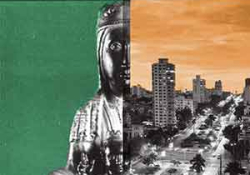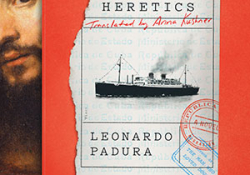The Pendulous Death of Raimundo Manzanero

Once again using the lens provided by detective fiction, Leonardo Padura magnifies various aspects of Cuban reality for his readers. “La muerte pendular de Raimundo Manzanero” appears here for the first time translated in English.
News
Last Sunday, October 21, at 4:23 p.m., Raimundo Manzanero, forty-six years of age, married, acting assistant economic manager of the National Leadership of NPI (the National Poultry Initiative), and resident of 146 Josefina St. in the Sevillano division of this capital, hung himself in his home, without verbally explaining, or through writing, the cause of the unfortunate event. According to experts, all the preparations for the hanging were made with great care, as if Raimundo Manzanero had previous experience in this type of suicidal activity. The noose, tied to a beam in the ceiling, had become exposed upon the explosion of the layer of lime and cement that had covered it. It was the exact height necessary for the rope to reach the neck of a man of five feet, six inches, standing on a chair (standard size: 42 cm), and the slipknot had previously been treated with grease to facilitate a better bearing. Meanwhile, the coroners that performed the autopsy, upon submitting the death report, specified that the cause of death was asphyxiation and not a broken neck, since all the neck vertebra of the deceased still remained perfectly intact. They noted, on the other hand, that in the stomach of the deceased were particles and spots characteristic of an incipient ulcer present, although perhaps already in a painful condition. The police investigators, for their part, admitted in their case report that the death was a suicide, although they did specify that they had still not found the ladder that was necessary to tie the rope to the beam in the ceiling at 4.2 meters in height. They also mentioned that the absence of a note seemed especially suspicious in this scene of events, since the statistics indicate that more than 99 percent of those that commit suicide by hanging explain the cause of their fatal decision with a note.
Although the news of our comrade Raimundo Manzanero’s suicide was not published in either a local or national newspaper—not that other suicides that are being recorded at an increasingly alarming rate each day in the country are usually published—the truth is that with this perfect attempt against his own life, Raimundo Manzanero betrayed all possible ideologies. He betrayed the ideology of his political militancy (member of the Party since the year 1978), the ideology of his religious militancy from the years of his childhood (altar boy and catechism instructor at the San Juan Bosco church, in the Santos Suárez neighborhood in Havana, between 1952 and 1957), and the ideology of his familial responsibility as the father of four children (of three marriages), the youngest of which is barely three years old.
Posthumously, Raimundo Manzanero was analyzed by the leadership of the Party due to his inconsistent attitude before his hardships. The parish priest of Colón Cemetery Chapel, in this capital, refused to officiate a mass for the dead, requested by the deceased’s mother, due to his incompatible attitude with the Christian commandments. Finally, his young widow, Eloísa Espinel, still puzzled by the irreversible decision made by the man who was her husband, commented among the grieving and other relatives that surrounded her at the wake that her dead husband did not deserve God’s forgiveness, nor man’s, and even less hers, since she had given the best of her youth to that “inconsiderate and thoughtless” man, according to her own words.
The burial took place Monday, October 2, at 3:55 p.m., despite the overwhelming shortages of flowers at the moment, and those present included few relatives and friends and only one coworker, a young secretary afflicted by the event. RIP.
Testimonies
“I swear to God, I just can’t explain it. Of course, I’ve known little Raimundo since he was a boy. His mother enrolled him in catechism when he turned six years old, and I always thought that he was a little bit of a mystic, his faith was so great. Sometimes he had dreams that seemed like revelations, and surely he didn’t invent them, I swear he didn’t. That is why we made him an altar boy and responsible for a catechetical group. He always seemed to be a person with a great fear of God, and that never hindered him from being the best second baseman that the church team had ever had. It was the only team capable of winning against the stars like the Maristas and against the school team from Belén. Also, of course, he was the captain of the team. Later, life’s ups and downs separated him from his religion—work, girlfriends, night classes—but every once in a while he came by the church. He asked me to hear his confession and later took communion, until around ’62, when he stopped. Through all those things, I found out that years later he would declare the Communist doctrine and was even very active in the Party; he was convinced, and he needed to express his conviction. It’s a shame, because I always remember him as a vivacious and imaginative young man; he even wrote poetry and everything. But it was shocking that he’d fallen into one of the most detestable mortal sins, because only the Father is empowered to decide the final fate of men: He gives us life and only He may take it away from us when He decides. As for me, it seems as if He has forgotten me because in January, I will turn ninety-two years old.” (Father Serafín Arnaz, assistant parish priest at the San Juan Bosco Church)
“The truth is, something stinks around here. You aren’t put in this for twenty years because you like it, and I’ve seen everything. . . . Of course, the case is already closed, and maybe it’s better to leave it like it is and not stir up trouble. But the thing about the ladder is so strange, for several reasons: there had to be a stepladder because the beam is in the middle of the room, and he wouldn’t be able to lean a regular ladder against the wall. And it’s not easy to get a stepladder three meters tall. And it’s not just that the infamous stepladder hasn’t appeared, or that no one has seen it: not the widow or the president of the Committee for the Defense of the Revolution (CDR), not the carpenter that lives in the middle of the block, in 136, and that does all the jobs in the area. Is it or is it not strange? But let’s not get too worked up about it, okay? And the thing about the note. . . . The first hanged man I’ve seen without a note! They always do it, because it seems to give them courage to hang themselves. It’s, like the Manual says, “typical.” The ones that set themselves on fire (the women, I should say, because fire is a woman’s thing) never write anything. The ones that throw themselves off a balcony don’t either, and neither do the ones that drown themselves on the beach. The ones that kill themselves with a shot or the ones that take pills, they almost always leave a note; but the ones that hang themselves, they do, always always. From what I’ve seen, first one without a note. So, isn’t this case the strangest?” (Lieutenant Cristóbal Cárdenas, La Víbora Military Unit, City of Havana)
“No, I swear I didn’t: I didn’t have anything to do with him. . . . But I just feel so bad. At the Company there were people who said he was rude, dogmatic, others said that he was an opportunist, and there were even those that said he was, and please pardon the expression, a huge son of a bitch. . . . But none of those people really knew him. He was a sensitive man that had experienced something big. I say it because I worked with him for a long time, and I am very observant. Truth be told, it’s one of the virtues I possess, don’t you think? There were times when he was in his office, and he kept staring right through the window at the street, where some very old carob trees were. He just lost himself in the view, as if he were seeing something that no one could see. One day when he was like that, it occurred to me to ask him if he was all right, and do you know what he told me? Well, he told me that he was thinking about the verse by Martí that says, ‘I am in the strange dance.’ Just imagine what an impression it made on me, so much that I have never forgotten. ‘I am in the strange dance.’ How sad and terrible, huh?” (Aleida Alou, Secretary ‘A,’ Economic Section, NPI)
“Of course not, of course I don’t understand it. What coworker like my comrade Mundo, I mean to say, my comrade Raimundo, would show such weakness? I can’t understand it. I thought I knew him well because we have worked together a long time. We served together since 1978. I, myself, was part of the duo that got him promoted, even that, and I don’t understand.” What weakness could a man like him have that he didn’t dare to confront whatever, no matter how difficult? Suicide is unacceptable, my friend, unacceptable. Besides, such a portrait of responsibility and reliability. . . . Nothing, I just don’t understand.” (Joaquín Zanabria, Executive Secretary, Leadership No. 1, PCC, NPI)
Note: The testimonies of Eloísa Espinel, Manzanero’s widow, and Aldo Hernández, childhood friend of the deceased, were not able to be obtained. The widow said that we already know her opinion about the case (refer to the declarations made during the wake), and Aldo Hernández excused himself by arguing that many people were at fault for what had happened, although the main guilty party was Manzanero himself, and that he didn’t feel himself in a position to judge.
Documents
As it appears in Raimundo Manzanero’s Labor Record (no. 44120300242, National Leadership of the National Poultry Initiative), he became a member of this section in 1970, after satisfactorily completing his labor at the front of the sugarcane camp, La Esperanza, Communications Ministry, during the Sugar Harvest of Ten Million. In the Managerial Section, he fills the leadership position in 1976 and there remains until 1984, when he is promoted to Assistant Manager of the Economic Division of the Company. He does not show labor sanctions of any kind. He continually displays labor merits, (c) volunteer work, (d) participation in watch duties and other center activities, (b) for discipline of labor and the fulfillment of his responsibilities, and (a) for having been elected Distinguished Worker. He also obtained merits on other occasions such as the (g) Educational Improvement, (f) Permanent Mobilization of Agriculture or Construction, and (h) Extraordinary Contribution to his Center of Investigative Work, Quality Control, or Prizes and Special Recognition, etc. In the periodic evaluations of his official Managerial Record, he always received work evaluations of Satisfactory or Outstanding. He was also recommended for promotion to higher management to the Ministry. In 1976 he was assigned his own vehicle (Peugeot), in addition to the one provided to the staff of the center to carry out his duties, and in 1982 it was replaced with a new one (Lada 1200). In 1980 he was given a house in the Alamar Division. In 1984 he was given another, in the Sevillano Division, since upon divorcing his second wife, mother of his two children, he had to go live in his parents’ house. On various occasions, he traveled abroad (USSR, Bulgaria, East Germany, Venezuela, Brazil, and others) on work missions that were satisfactorily carried out, and on one occasion to Czechoslovakia on an incentive trip or exchange granted by the Ministry.
Note found in Raimundo Manzanero’s agenda from 1982.
<<April 22nd. Plan of the day:
>>9 a.m. Managerial Dispatch. Issue: Question Alcántara about the 325 chickens that were lost in the Santiago de las Vegas Slaughterhouse.
>>11 a.m. Meeting with Mirta and Ernesto about the personnel revision.
>>1 p.m. Managerial Dispatch. Revision of the CAME agreements.
>>4 p.m. Department Meeting. Information about the results of the Alcántara case, over the personnel revision, over the new CAME agreements, evaluation of Aleida and Figueredo, opinions about the petition for new office equipment, and General Issues.
>>Beautiful day, like all of my days. Each moment, I feel even more like I’m in a strange dance, a very quick one, always in a circle, from which I cannot escape. Sisyphus and the stone. Prometheus and the eagles. Outside the sky is blue, as it can only be in April, and this morning there are more sparrows on the carob trees than ever. I survive. I survive.>>
Note on the last page of A Moveable Feast, by Ernest Hemingway (Art and Literature Editorial, Hurricane Collection, City of Havana, 1988, pg. 184), found on Raimundo Manzanero’s bookshelf.
<<Reading this has made me feel such pain in my soul. In the middle of my soul. It is devastating and implacably disturbing to a man like me. And he is right: Paris will never end, but there are those for whom it never begins. And people for whom it began and then ended immediately. One needs courage to be very poor and very happy. I’m going to turn forty-six.>>
Rumors on the Street and Comments in the Hallways
Roberto Alcántara, Slaughterhouse Admistrator No. 1, <<Cuban-Soviet Friendship>>, Santiago de las Vegas, NPI: “I always said he was a son of a bitch and that he was going to end up like this.”
Lidia Mendoza, Secretary of NPI Leadership Initiative: “Lately, he was always out there, and the Boss said to him: ‘Raimundo, get your head back down here and not up in the clouds.’ Poor thing.”
Enrique Corrales, carpenter, neighbor at 136 Josefina St.: “I bet he found out that his wife was banging the postman. The postman always visited Raimundo’s house twice a day.”
Magdalena Grau, Manzanero’s first wife: “I always imagined that one day he was going to do this. You can’t live thinking that you could be different. And my son, little Raimundo, is going to be exactly the same, I swear.”
Consuelo Armenteros, Janitorial Staff for the Leadership Committee of the NPI: “Imagine, the last time that we were talking for a little bit, he asked me if I was going to clean floors all my life. And do you know what I said to him—Oh, it’s so awful!—I told him that I was aspiring to his position and that he better watch out.”
Roberto Ortiz, Raimundo Manzanero’s maternal uncle: “And you think it’s true that he killed himself? No way, I’m going to really find out, because our Raimundo wasn’t that kind of man.”
Sergio Figueredo, Personnel Manager of the NPI National Leadership Initiative: “Fuck, with how well he was living, that bastard. A house, a car, trips, his little chicks and his little turkeys every once in awhile, a young girl, what a piece of shit. If you ask me, as long as there are still five chickens on the island, he is going to eat one of them. But that’s his deal, huh?”
Another Document
Manuscript page (bond paper 8½ x 11, Leadership of the National Poultry Initiative, NPI letterhead), found in a desk drawer, in between diplomas, letters of recognition, certificates of volunteer work, evaluations, etc., in Raimundo Manzanero’s home.
<<Today, on the beach, talking with Aldo, I felt so bad for him. I wanted to be able to tell him, but I know that I will never, ever dare to do it. That’s why I write about it, to at least be able to say it to myself, that I’m in the same boat. Aldo says that he’s happy, and he really is, only because he’s alive, he’s healthy, and he can go to the beach on Sunday with his wife and kids. Could this be the utopia of happiness? Surely not. Aldo—like me—is barely surviving. And how are we going to survive? We are barely a vessel that contains life, but that life has dried it out because we haven’t sustained the reason for the risk: we settle and that’s how we go on surviving. I always thought that surviving was for animals: eat, sleep, procreate. To live is something else, more creative and, precisely, more lively. But there is no vitality or creativity in what we do or who we are. He doesn’t love his wife, he just settles for cheating on her; he can’t resist Eloísa and laughs at her jokes. It’s not much, but he accepts it. And me, in the end, what do I want? I think that I am barely being myself, and I don’t dare to be. I have spent all these years betraying myself to have what I have, which is not what I should have or what I would like to have. I think that one day . . . (and the manuscript is cut short).>>
Subjective Analysis of a Suicide By Hanging and an Outline of a Possible Suicide Note That Was Never Written
It will never be known, with the necessary objectiveness, what Raimundo Manzanero was thinking on the afternoon of October 26 when, at least officially, he decided to look for a stepladder at least 3 meters tall1 to fit the greased rope through the miniscule space that existed between the steel beam and the concrete plate, by which he would hang himself sometime after 4:23 p.m. Perhaps Raimundo did not think that particular afternoon was one of the most beautiful afternoons of the year: It was sunny, the sky was clear, and, nevertheless, a decidedly autumn breeze was cooling the city and announcing a sweet and mild night. Perhaps he did think that with just two bags of cement—you can always come by two bags of cement—he could fix that chip on the highest prop in the ceiling of that house. His house was built in 1938 by unknown and coldhearted owners who had abandoned it forever in 1961 when they set off for Miami. Maybe he even thought that, for many, he was a fortunate man: he had a house, a car—his own from the State with a special allocation for gasoline—he traveled abroad, he dressed and ate well—he never ate chicken, since it had come to disgust him—and at forty-six years of age he enjoyed a wife of twenty-five. She was olive-skinned, nicely shaped, and faithful as far as his reports and assurances could guarantee. He thought, of course he thought it, that hanging himself by the neck would hurt a lot and that the seconds that death would delay its arrival are, literally, agonizing. And afterward, a hanged man sticks out his tongue and—it doesn’t seem to be a joke—he pisses and even shits on himself. And he didn’t think about it, because if he had thought about it, since in his case his death was indispensable and disciplined, he would have left a note, or at least a memo, explaining his decision.
If Raimundo Manzanero had written his final note, perhaps it would have earned him the forgiveness from one of his slanderers. Or perhaps not: the note would have simply not justified it. But if he had definitely decided on the indispensable letter—dealing with his own case—it is almost certain that he would have written it to himself, since he had no one to blame, no one to forgive, and not even anyone to whom he could explain the reason for his determination. It is difficult to imagine that he would have written that missive to himself: although, dealing with such a close addressee, a few words would have been sufficient. Perhaps only one.
But, definitively and verifiably, such a letter never existed. His thoughts that afternoon and the motive of his decision remain in the realm of the most subjective and ambiguous speculation. What is absolutely certain is that Raimundo Manzanero, at the time that he was betraying all possible ideologies and upon undertaking that strange pendulous dance, was trying to make amends for his own most intolerable betrayal.
1 Note: Finally, the ladder allegedly used by Raimundo Manzanero was found in the house of his uncle Roberto Ortiz—with which his suicide was officially proven by the police—six blocks from the place of the events in question. It seems incredible that his uncle did not remember for several days that he owned this type of ladder and even more incredible that no one saw Raimundo Manzanero transport such a conspicuous object in the middle of the day on a Sunday. He walked from his uncle’s house to his own: passing in front of two little shops, an underground bar, the corner where the flower salesmen meet, and even a zone of the CDR, and then later he returned it—again without being seen—to its place of origin. In addition, the greased noose would have been hanging from the ceiling for more than fifteen minutes while Eloísa Espinel and her young son were taking a Sunday- afternoon nap. As she herself reported during the investigations, “She refused to see the movie shown during the Sunday series because it was about a little girl who remained blind and she already has enough misfortunes in her life without watching those of others on the television.”
Translation from the Spanish
By Christina Miller
Source: “La muerte pendular de Raimundo Manzanero,” in La Puerta de Alcalá y otras cacerías, ed. José Fco. Tinao Martín-Peña (Madrid: Olalla Ediciones, S.L., 1998). Copyright © 1993 by Leonardo Padura Fuentes.
Editor’s Note
Read also on the WLT website, Padura's essay “Writing in Cuba in the Twenty-first Century.”











